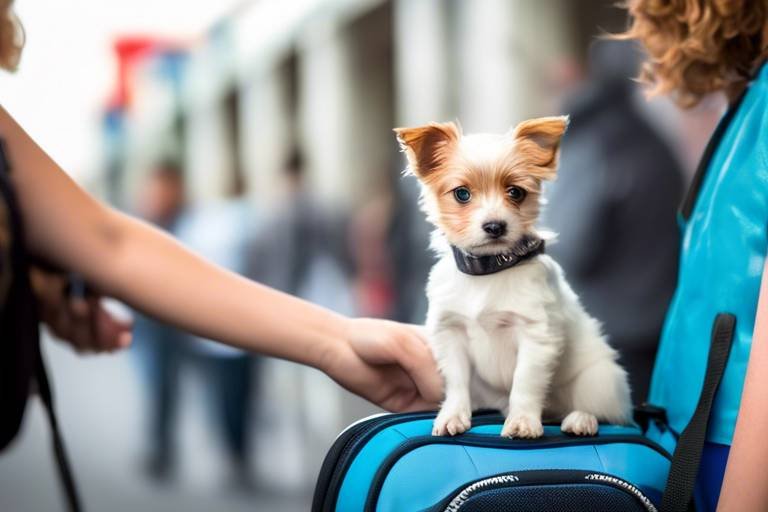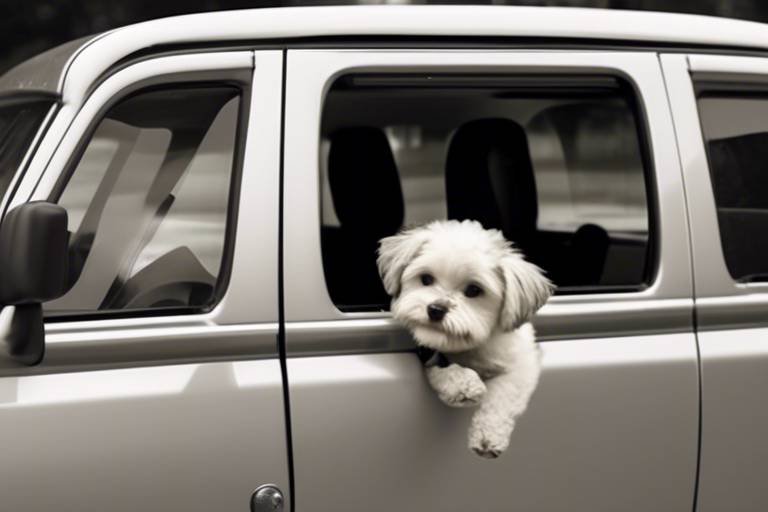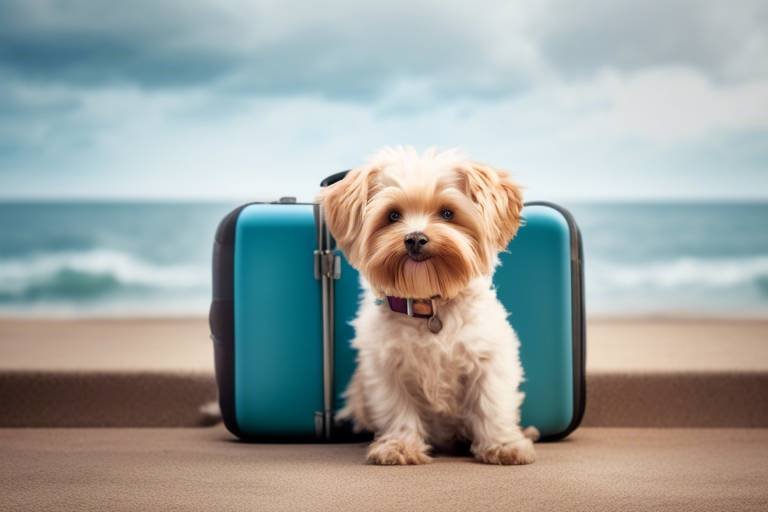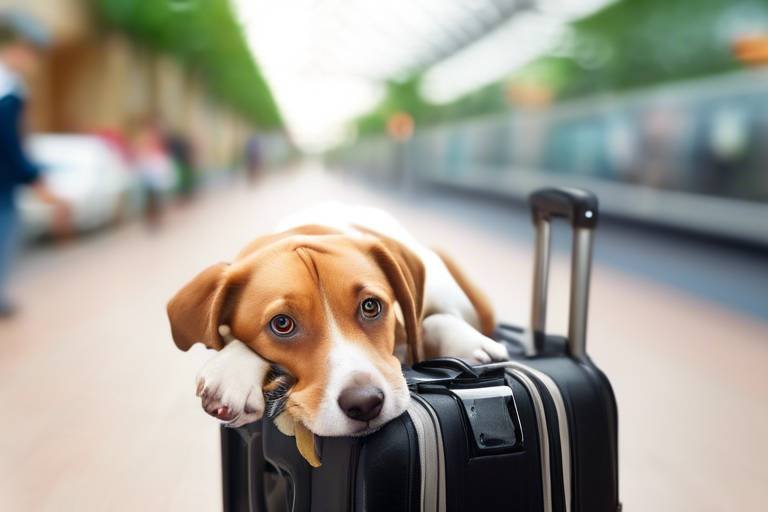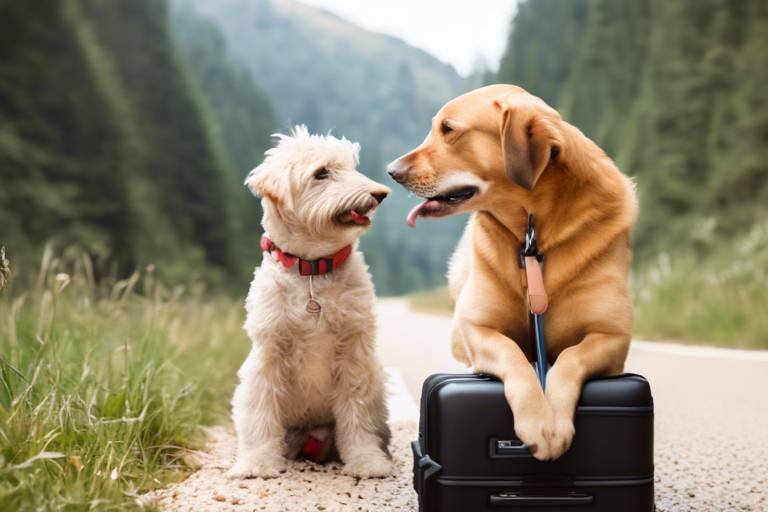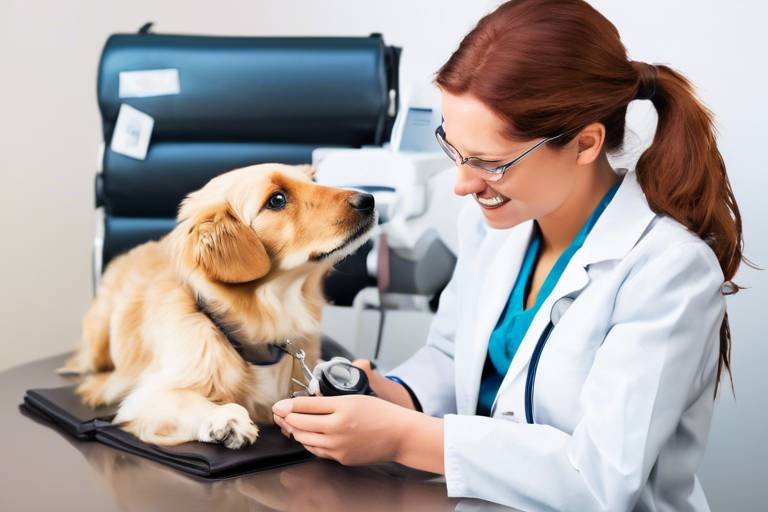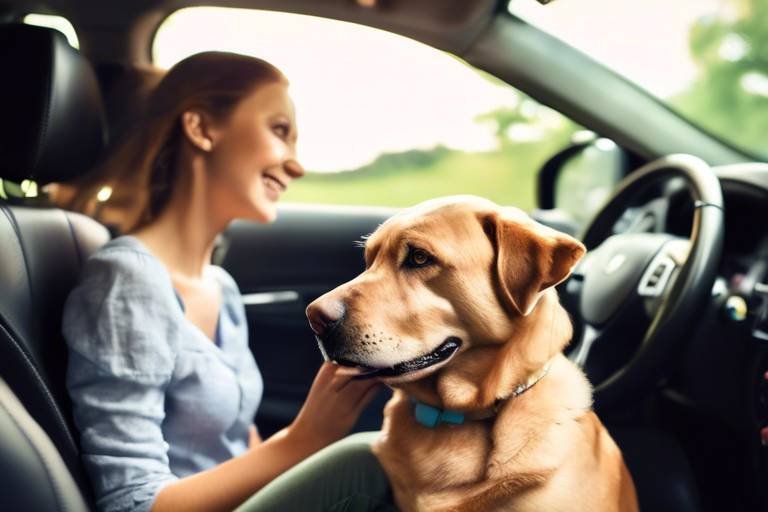Traveling with Pets - The Benefits of Preparation
Traveling with pets can be one of the most rewarding experiences for both you and your furry friend. However, it requires a level of preparation that can significantly enhance the journey. Imagine setting off on an adventure, your beloved pet happily by your side, both of you ready to explore new horizons together. But wait! Without proper planning, that dream trip might quickly turn into a chaotic experience. This is where the benefits of thorough preparation come into play. By taking the time to understand your pet's needs, choosing the right destinations, and ensuring health and safety protocols are in place, you can create a travel experience that is enjoyable and stress-free for both you and your pet.
First and foremost, understanding your pet's unique needs is crucial. Just like us, pets have their own preferences and requirements. From dietary restrictions to exercise routines, knowing what makes your pet comfortable can greatly reduce stress during the trip. Have you ever tried to enjoy a meal while worrying about your pet's well-being? It's not easy! By preparing ahead of time, you can ensure that your pet has everything they need, allowing both of you to relax and enjoy the journey.
Next, choosing pet-friendly destinations is essential. Not every hotel or attraction welcomes pets with open arms. Imagine arriving at a beautiful hotel only to find out that your furry friend isn't allowed. It can be a real downer! Therefore, researching accommodations that cater to both you and your pet is vital. Look for places that offer pet-friendly amenities, such as dog parks or pet-sitting services. This way, you can enjoy your vacation without worrying about your pet's comfort and happiness.
Moreover, understanding the pet policies of your chosen accommodations can save you from unexpected surprises. Each place has its own set of rules regarding pets. Some may charge additional fees, while others may have restrictions on the size or breed of pets. By reading and comprehending these guidelines beforehand, you can avoid any last-minute hiccups that could dampen your travel experience.
When it comes to the logistics of traveling with pets, preparation is key. Whether you're driving or flying, ensuring your pet's safety during transit is paramount. This includes having the right transportation options, such as a secure pet carrier, and packing essential supplies like food, water, and a first-aid kit. After all, a well-prepared journey can make all the difference in keeping your pet calm and comfortable throughout the trip.
Lastly, health and safety considerations should always be at the forefront of your travel plans. Before hitting the road, a visit to the vet is essential to ensure your pet is healthy and up-to-date on vaccinations. It's like giving your pet a little insurance policy for their travels! Additionally, being prepared for emergencies is crucial. Knowing where the nearest veterinary services are located and having a well-stocked first-aid kit can provide peace of mind during your travels.
In conclusion, traveling with pets can be a joyous experience, but it requires careful planning and preparation. By understanding your pet's needs, choosing the right destinations, and prioritizing health and safety, you can create memorable adventures that you and your furry companions will cherish for years to come. So, what are you waiting for? Start planning your next pet-friendly adventure today!
- What should I pack for my pet when traveling? Be sure to include food, water, bowls, leash, waste bags, and any medications your pet may need.
- Can I take my pet on an airplane? Yes, but it's essential to check the airline's pet policy and make the necessary arrangements in advance.
- What if my pet gets anxious during travel? Consider consulting your vet for advice on calming products or techniques to help soothe your pet.
- Are there any specific vaccinations required for traveling with pets? This can vary by destination, so check with your veterinarian for any necessary vaccinations or health certificates.

Understanding Your Pet's Needs
When it comes to traveling with your furry friends, understanding their unique needs is the key to a smooth and enjoyable journey. Just like humans, pets have their own dietary requirements, exercise routines, and comfort preferences. For instance, if your dog is used to a specific brand of food, imagine the stress it would cause if you suddenly switch to something unfamiliar during your trip. To avoid such scenarios, it's important to plan ahead and cater to their needs.
First off, let’s talk about dietary needs. Make sure to pack enough of their regular food, and don’t forget to include some treats! If your pet has any dietary restrictions, such as allergies, you’ll want to keep those in mind while selecting snacks for the road. Consider bringing a portable food and water bowl, as well as a cooler for perishable items. This way, your pet can enjoy their meals just like they would at home, making the trip more comfortable for them.
Next, we have exercise routines. Pets, especially dogs, thrive on routine, and a sudden change can lead to anxiety or restlessness. If your dog usually gets a long walk every evening, try to maintain that routine even while traveling. Research parks or trails at your destination where you can take your pet for daily exercise. Not only will this help your pet stay calm, but it will also give you both a chance to explore new environments together.
Finally, let’s not forget about comfort preferences. Some pets may have specific items that make them feel safe, such as their favorite blanket or toy. Bringing these familiar items can help alleviate anxiety and make them feel more at home, even in unfamiliar surroundings. Additionally, consider their sleeping arrangements. If your pet is used to sleeping in a certain spot, try to replicate that as closely as possible in your new accommodations.
In summary, understanding your pet's needs is essential for a successful travel experience. By paying attention to their dietary requirements, exercise routines, and comfort preferences, you can ensure that your furry companion has a stress-free journey. Remember, a happy pet means a happy owner, so take the time to prepare for their unique needs before hitting the road!

Choosing Pet-Friendly Destinations
When it comes to traveling with your furry friend, choosing the right destination can make all the difference in your experience. Imagine this: you’ve packed your bags, loaded up the car, and are ready for an adventure, but your pet is left feeling anxious and uncomfortable because the destination isn’t suitable for them. To avoid this scenario, it’s essential to consider a few key factors that will ensure both you and your pet have a fantastic time.
First and foremost, think about your pet’s personality and energy levels. Does your dog love to run around and explore? Or is your cat more of a homebody? Understanding their temperament will help you select a destination that matches their needs. For instance, if you have an adventurous pup, look for locations near hiking trails, dog parks, or beaches where they can roam free. On the other hand, if your pet prefers a quiet environment, consider a cozy cabin in the woods or a peaceful beach retreat.
Next, it’s crucial to research pet-friendly accommodations. Not all hotels or rentals cater to pets, and showing up at a place that doesn’t welcome your furry companion can be a major disappointment. Here are some tips to find the perfect spot:
- Use travel websites that specialize in pet-friendly options.
- Read reviews from other pet owners to gauge their experiences.
- Contact the accommodation directly to ask about their pet policies.
In addition to accommodations, consider the local attractions. Not every destination offers activities that allow pets, so it’s essential to do your homework. Look for local parks, pet-friendly restaurants, and outdoor activities that will make your trip enjoyable for both you and your pet. For example, some cities have dog-friendly beaches or trails where your pet can join in on the fun. You can even find places that offer pet-sitting services, allowing you to explore without leaving your pet behind.
Another aspect to consider is the climate of your destination. Pets can be sensitive to extreme temperatures, so think about whether your travel time aligns with a comfortable season for your furry friend. For example, if you’re heading to a warm beach destination, ensure that there are shaded areas and plenty of water available for your pet. Conversely, if you’re traveling to a colder region, make sure your pet has the right gear to keep warm and cozy.
Lastly, don’t forget about the logistics of getting to your destination. Whether you’re driving or flying, it’s essential to plan how your pet will travel. If you’re driving, make sure to take regular breaks for bathroom and exercise time. If you’re flying, check the airline’s pet policy and prepare your pet for the journey. A little preparation goes a long way in ensuring a smooth travel experience.
In summary, choosing a pet-friendly destination involves understanding your pet’s needs, researching accommodations and local attractions, considering the climate, and planning the logistics of travel. With the right preparation, you can create unforgettable memories with your furry companion, making every adventure a joyous occasion.
Q: How can I find pet-friendly accommodations?
A: Use travel websites that specialize in pet-friendly options, read reviews, and contact accommodations directly to inquire about their pet policies.
Q: Are there any specific activities I can do with my pet while traveling?
A: Look for local parks, dog-friendly beaches, and pet-friendly restaurants. Some destinations even offer pet-sitting services for when you want to explore without your pet.
Q: What should I consider regarding my pet's health when traveling?
A: Ensure your pet is up-to-date on vaccinations, and consider a vet visit before your trip. Always have a first-aid kit handy and know the location of local veterinary services.
Researching Accommodations
When it comes to traveling with your beloved pet, finding the right place to stay can be a game-changer. Imagine this: you’ve planned a fantastic getaway, but the last thing you want is to end up in a place that doesn’t welcome your furry friend with open arms. The key to a delightful trip lies in thorough research of pet-friendly accommodations. Not only does this ensure that your pet is comfortable and safe, but it also allows you to relax and enjoy your vacation without constantly worrying about your pet’s well-being.
First and foremost, start by narrowing down your destination. Once you have that locked in, dive into the world of online resources. Websites like BringFido and PetsWelcome are excellent places to begin your search. They provide extensive lists of hotels, vacation rentals, and even campgrounds that are pet-friendly. You can filter your search based on your pet’s size, breed, and even specific amenities such as dog parks or pet-sitting services. This way, you can find a place that suits both your needs and your pet’s.
Next, don’t forget to read the reviews. Previous guests often share their experiences regarding how accommodating the staff is towards pets, the cleanliness of the space, and any additional fees that might apply. You’d be surprised how much insight you can gain from just a few minutes of reading. It’s like having a conversation with someone who’s been there before, helping you avoid any potential pitfalls.
Another critical aspect to consider is the type of accommodation that will best suit your travel style. For instance, if you’re an adventurous spirit who loves the outdoors, a pet-friendly campsite might be the perfect fit. On the other hand, if you prefer the comforts of home, look into vacation rentals that allow pets. These often come equipped with kitchens, so you can prepare meals for both yourself and your furry companion. Whatever your preference, the right accommodation can make all the difference.
Here’s a quick table summarizing the types of accommodations you might consider:
| Accommodation Type | Pros | Cons |
|---|---|---|
| Hotels | Convenient, often have pet amenities | May charge extra fees |
| Vacation Rentals | More space, home-like environment | Less immediate service |
| Campsites | Close to nature, often very pet-friendly | Limited amenities |
Lastly, always check the pet policies of your chosen accommodation. Some places may have restrictions on the number of pets, size limits, or specific breeds that are not allowed. Understanding these policies beforehand can save you from unexpected surprises and ensure a smooth check-in process. Remember, it’s always better to ask questions than to assume. If something is unclear, don’t hesitate to reach out to the property directly.
In conclusion, researching accommodations for your pet-friendly travel adventure is not just a task; it’s an essential step in crafting a memorable experience for you and your furry friend. With the right preparation, you can ensure that both you and your pet will have a fantastic time exploring new places together!
- What should I look for in a pet-friendly hotel?
Look for amenities like pet beds, food bowls, and nearby parks. Always check the pet policy, including fees and restrictions. - Are there additional fees for bringing my pet?
Many places charge a pet fee or require a deposit. Always confirm before booking. - Can I leave my pet alone in the room?
This varies by accommodation. Some hotels allow it while others do not, so check their policy. - What if my pet gets sick while traveling?
Research local veterinary services in advance and keep a pet first-aid kit handy.
Understanding Pet Policies
When it comes to traveling with your furry friends, at your chosen accommodations is absolutely essential. Each hotel, vacation rental, or campsite has its own set of rules and regulations regarding pets, and being unaware of these can lead to unexpected surprises that might dampen your travel experience. Imagine arriving at a beautiful hotel only to find out that your beloved pet is not welcome, or worse, that you’ll incur hefty fees for having your pet with you!
Before you book your stay, take the time to thoroughly research the pet policies of your accommodations. Here are a few critical aspects to consider:
- Pet Size and Breed Restrictions: Some places have restrictions on the size and breed of pets they allow. For instance, larger breeds like Great Danes may not be permitted, while smaller breeds often have fewer restrictions.
- Number of Pets Allowed: Make sure to check how many pets you can bring along. Some places may limit you to just one pet, while others might welcome a whole pack!
- Fees and Deposits: Many pet-friendly accommodations charge additional fees or require a pet deposit. Knowing these costs upfront can help you budget better for your trip.
- Designated Areas: Some establishments may have specific areas for pets, such as designated pet-friendly rooms or outdoor spaces. Familiarize yourself with these to ensure your pet has a comfortable stay.
- Pet Behavior Expectations: Understand the expectations regarding your pet's behavior. Many accommodations require pets to be well-behaved and may have rules about leaving them unattended in the room.
It's also wise to reach out directly to the accommodation if you have any specific questions or concerns. A quick phone call can often clear up any uncertainties and provide you with peace of mind. Additionally, reading reviews from other pet owners who have stayed at the same place can offer valuable insights into how accommodating the establishment truly is.
Ultimately, understanding pet policies not only helps you avoid unfavorable situations but also ensures that your pet has a pleasant experience. After all, a relaxed and happy pet makes for a much more enjoyable trip for everyone involved!
Exploring Local Attractions
When it comes to traveling with your furry friends, exploring local attractions can be one of the most exciting parts of your journey. However, not all destinations are created equal when it comes to pet-friendliness. It's essential to do your homework to ensure that both you and your pet can enjoy the sights without any hiccups. Imagine arriving at a beautiful park only to find out that pets are not allowed! To avoid such disappointments, here are some tips to consider when exploring local attractions.
First and foremost, research is key. Look for local parks, beaches, and hiking trails that welcome pets. Websites and apps dedicated to pet-friendly travel can be incredibly helpful. They often provide user-generated reviews and insights, which can be invaluable in finding spots where your pet is not just allowed but also welcomed with open arms. For example, many cities have off-leash parks where your dog can run free and socialize with other pups, turning a simple outing into a fun adventure.
Additionally, consider the types of activities available in the area. Some attractions may offer pet-friendly events or festivals, which can be a great way to meet other pet owners and enjoy the local culture. Whether it's a dog-friendly wine tasting or a pet parade, these events can add a unique twist to your travel experience. Always check the event's website for specific pet policies, as some may have restrictions.
Another important factor to consider is the weather. If you're traveling during the hotter months, make sure to choose attractions that provide shade and water for your pet. Some parks may have designated pet areas with amenities to keep your furry friend comfortable. On the other hand, if you're in a colder climate, look for indoor pet-friendly venues, such as pet boutiques or cafes where your pet can stay warm and cozy.
Lastly, don’t overlook the importance of local pet services. Knowing where the nearest pet-friendly vet or pet store is located can be a lifesaver in case of emergencies. Many local attractions will have this information readily available, but it’s always good to have a plan in place. You might even want to create a small table in your travel journal listing these services, ensuring you have quick access to them during your trip.
| Local Service | Location | Contact Information |
|---|---|---|
| Pet-Friendly Park | Main Street Park | (123) 456-7890 |
| Veterinary Clinic | City Vet Hospital | (987) 654-3210 |
| Pet Supply Store | Happy Paws Supplies | (555) 555-5555 |
In conclusion, exploring local attractions with your pet can be a delightful experience if you take the time to plan ahead. By researching pet-friendly spots and understanding the local landscape, you can ensure that your trip is enjoyable for both you and your furry companion. So pack those bags, grab the leash, and get ready for an adventure that you both will cherish!
Q: Are all parks pet-friendly?
A: No, not all parks allow pets. Always check the specific park's regulations before visiting.
Q: What should I do if my pet gets sick while traveling?
A: Make sure to have a list of local veterinarians and emergency pet clinics before you travel.
Q: Can I take my pet to restaurants?
A: Some restaurants have outdoor seating that allows pets. Always call ahead to confirm their pet policy.
Preparing for Travel Logistics
When it comes to traveling with your furry friend, preparation is key. Imagine embarking on a road trip without a map or packing for a vacation without knowing the weather forecast—chaos, right? The same principle applies to traveling with pets. You need to have a solid plan in place to ensure that both you and your pet have a smooth and enjoyable experience. First and foremost, consider your transportation options. Are you driving, flying, or taking a train? Each mode of transport comes with its own set of rules and requirements for traveling with pets. For instance, if you're flying, you need to check the airline's pet policy, which may include specific carrier dimensions, health certificates, and even fees. On the other hand, if you're driving, you might want to plan for regular breaks to let your pet stretch their legs and relieve themselves.
Next, think about safety measures. Just like you buckle up in a car, your pet should be secured too. Invest in a good quality pet seatbelt or a travel crate that meets safety standards. Not only does this keep your pet safe during the journey, but it also minimizes distractions while you're driving. Additionally, ensure that your pet has an ID tag with your contact information, and consider microchipping them for extra security, especially if you're traveling to unfamiliar places.
Now, let’s talk about necessary supplies. Packing for your pet is just as important as packing for yourself. Make a checklist of essential items to bring along, including:
- Food and water bowls
- Enough food for the duration of the trip
- A leash and harness
- Waste bags for clean-up
- Comfort items, such as their favorite blanket or toy
- A first-aid kit specifically for pets
Having these items on hand will not only make your pet feel more comfortable but will also help you manage any situation that may arise. For example, if your pet gets anxious during travel, having their favorite toy can provide a sense of familiarity and comfort. Moreover, don’t forget to carry any medications your pet might need, along with the instructions for administering them.
Finally, it’s wise to research pet-friendly stops along your route. Whether it’s a rest area with a designated pet space or a hotel that welcomes pets, knowing where you can take breaks or spend the night will make your journey much more enjoyable. By planning your logistics meticulously, you can turn what could be a stressful experience into a delightful adventure for both you and your beloved pet.

Health and Safety Considerations
When it comes to traveling with your furry friends, health and safety should always be your top priority. Just like you wouldn't set off on a road trip without ensuring your car is in good shape, you shouldn't embark on a journey with your pet without making sure they are healthy and safe. A little bit of preparation can go a long way in keeping your pet comfortable and secure while exploring new places. So, what do you need to consider?
First and foremost, a visit to the veterinarian is essential before you hit the road. This pre-travel check-up allows you to ensure that your pet is in good health and up-to-date on all necessary vaccinations. Depending on your destination, certain vaccinations may be required, especially if you're crossing state lines or traveling internationally. For instance, rabies vaccinations are often mandated, and having proof of these vaccinations can save you from unnecessary hassles at checkpoints or accommodations.
During the vet visit, it’s also wise to discuss any specific health concerns your pet may have. For example, older pets or those with chronic conditions may require special attention or medication while traveling. Your vet can provide you with advice on how to manage these conditions on the go, ensuring your pet remains as stress-free as possible.
Another critical aspect of health and safety is understanding the emergency protocols that you should have in place. Accidents can happen, and knowing what to do in an emergency can make all the difference. Here are a few steps to consider:
- Research local veterinary services at your destination. Keep a list of nearby clinics and emergency animal hospitals.
- Pack a first-aid kit specifically for your pet. This should include items like bandages, antiseptic wipes, and any medications your pet might need.
- Have a plan in case your pet gets lost. Microchipping your pet is a great way to ensure they can be returned to you if they wander off.
Additionally, you should always carry your pet’s health records with you. This documentation can be crucial if you need to visit a vet while traveling. It should include vaccination records, any medications they are on, and any pertinent medical history. Having this information readily available can streamline the process and provide peace of mind.
Lastly, don’t forget about travel insurance. While it may seem like an unnecessary expense, it can be a lifesaver in case of unexpected situations. Some travel insurance policies cover pet-related incidents, including medical emergencies or trip cancellations due to your pet’s health issues. It’s definitely worth considering, especially if you’re planning an extended trip.
In conclusion, taking the time to focus on health and safety considerations can transform your travel experience from potentially chaotic to wonderfully enjoyable. By ensuring your pet is healthy, prepared for emergencies, and well-cared for during your journey, you can create lasting memories without the stress. After all, a happy pet means a happy owner!
Here are some common questions pet owners have when preparing to travel with their pets:
- What vaccinations does my pet need before traveling? - This can vary by destination, but rabies and distemper vaccinations are commonly required.
- Should I take my pet's food and water? - Yes, it's advisable to bring your pet's usual food and a supply of water, especially if they have specific dietary needs.
- Can I leave my pet alone in a hotel room? - It's best to check the hotel's policy. Some places allow it, while others may not.
- What should I do if my pet gets sick while traveling? - Locate a nearby vet and have your pet's medical records on hand to assist with treatment.
Veterinary Check-Ups
Before you embark on your exciting adventure with your furry friend, it’s absolutely essential to schedule a veterinary check-up. Just think of it as a pre-flight inspection for your pet! Ensuring that your pet is in tip-top shape not only gives you peace of mind but also helps to avoid any potential health issues that could arise during your travels. A visit to the vet allows you to confirm that your pet is up-to-date on vaccinations and free from any underlying health problems that might cause trouble on the road.
During this check-up, be sure to discuss your travel plans with your veterinarian. They can provide you with valuable insights tailored to your pet's specific needs. For example, if you’re heading to a different climate, your vet might recommend additional precautions to keep your pet comfortable and safe. Furthermore, if your pet is on any medications, the vet can ensure you have enough supplies for the duration of your trip, along with instructions on how to administer them if needed.
Additionally, it's a good idea to ask your vet for a copy of your pet's medical records. This documentation can be crucial in case of an emergency while you’re away. Some places may even require proof of vaccinations for pet-friendly accommodations or activities. Having this information handy will save you from unnecessary stress and complications.
Here’s a quick checklist of what to cover during the veterinary check-up:
- Vaccination Status: Ensure all vaccinations are current.
- Health Evaluation: Discuss any existing health concerns.
- Medication Needs: Confirm you have enough medication for the trip.
- Travel Advice: Get tips specific to your travel destination.
- Emergency Contacts: Ask for local vets at your destination.
By taking these steps, you’re not just preparing for a trip; you’re ensuring a safe and enjoyable experience for both you and your pet. Remember, a little preparation goes a long way in making your travel adventure smooth and enjoyable!
Q: How far in advance should I schedule a veterinary check-up before traveling?
A: Ideally, you should schedule your check-up at least a few weeks prior to your trip. This gives you ample time to address any health issues that may arise.
Q: What should I do if my pet has a health condition?
A: If your pet has a pre-existing health condition, consult your vet about your travel plans. They may recommend specific accommodations or precautions to take.
Q: Do I need to bring my pet's medical records with me?
A: Yes, it's wise to keep a copy of your pet's medical records with you when traveling, especially if your destination requires proof of vaccinations.
Q: What if my pet gets sick while traveling?
A: Research local veterinary services at your destination beforehand. Keep a list of nearby vets and emergency clinics just in case.
Emergency Preparedness
When traveling with your beloved pet, being prepared for emergencies is not just a good idea—it's essential. Imagine you're on a scenic road trip, the wind in your hair, and then suddenly, your furry friend gets sick or injured. The last thing you want is to be caught off guard in a strange place without a plan. To avoid such heart-stopping moments, it’s crucial to have a solid emergency preparedness strategy in place.
Start by researching local veterinary services at your destination. Knowing where the nearest animal hospital or vet clinic is located can save precious time in case of an emergency. It's wise to jot down the contact information and address of these facilities before you hit the road. You might even consider creating a small travel folder with this information, which you can easily access whenever you need it.
In addition to knowing where to go for help, having a well-stocked pet first-aid kit can make a world of difference. This kit should include essentials such as:
- Bandages and gauze
- Antiseptic wipes
- Pet-safe pain relievers (consult your vet first)
- Emergency contact numbers, including your vet's information
- Any medications your pet may need
It's also a good idea to keep a copy of your pet's medical records and vaccination history with you. In case of an emergency, this information can be crucial for veterinarians who need to know your pet's health background quickly. You can even store these documents digitally on your phone or in a cloud service for easy access.
Lastly, don’t forget about the importance of having a contingency plan. Think about what you would do if you needed to evacuate your hotel or campsite suddenly. Make sure your pet is familiar with their carrier or leash, and practice getting them into it quickly. This practice can help reduce stress for both you and your pet during a real emergency.
In summary, being prepared for emergencies can transform a potentially chaotic situation into a manageable one. By knowing where to find help, having a well-stocked first-aid kit, keeping your pet's medical records handy, and having a contingency plan, you can travel with peace of mind, knowing that you’re ready for anything that might come your way.
1. What should I include in a pet first-aid kit?
Your pet first-aid kit should include bandages, antiseptic wipes, pet-safe pain relievers, emergency contact numbers, and any medications your pet may need. Don’t forget to consult your vet for specific recommendations!
2. How can I find a vet in a new area?
Research local veterinary services before traveling. You can use online maps, local directories, or ask fellow pet owners for recommendations. Always have the contact information handy!
3. What if my pet has a medical emergency while traveling?
If your pet has a medical emergency, remain calm and quickly locate the nearest veterinary clinic. Have your pet's medical records and any relevant information ready to share with the veterinarian.
4. Is travel insurance necessary for pets?
While not mandatory, pet travel insurance can provide peace of mind. It can cover unexpected veterinary expenses, ensuring your pet receives the care they need while you’re away.
Frequently Asked Questions
- What should I consider when preparing to travel with my pet?
Before you hit the road, think about your pet's specific needs. This includes their dietary requirements, exercise routines, and comfort preferences. Ensuring that you have all the necessary supplies, like food, water, and toys, can make the journey smoother for both of you.
- How do I choose a pet-friendly destination?
Look for destinations that offer accommodations and activities that welcome pets. Research online for pet-friendly hotels, parks, and attractions, and read reviews from other pet owners. A little homework can lead to a fantastic trip for you and your furry friend!
- What are the best ways to find pet-friendly accommodations?
You can use various websites and apps that specialize in pet-friendly listings. Always check the fine print regarding their pet policies, including any fees or restrictions, to avoid surprises upon arrival.
- What health and safety preparations should I make for my pet?
Schedule a vet visit before traveling to ensure your pet is healthy and up-to-date on vaccinations. It's also wise to have a first-aid kit handy and know where local veterinary services are located in case of emergencies.
- How can I ensure my pet's comfort during travel?
Make sure your pet has a comfortable space in the car or travel carrier. Bring their favorite blanket or toy, and take regular breaks during long trips to let them stretch their legs and relieve themselves.
- What should I do in case of an emergency while traveling?
Be prepared by having a plan in place. Research local veterinary services in your travel area and keep emergency contact numbers handy. Having a pet first-aid kit can also be a lifesaver in unexpected situations.


